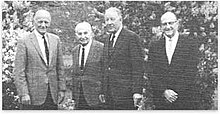Leonard Read
| Leonard Read | |
|---|---|

|
|
| Born |
September 26, 1898 Hubbardston, Michigan, U.S. |
| Died | May 14, 1983 (aged 84) |
| Nationality | American |
| Institution | Foundation for Economic Education (founder) |
| School or tradition |
Austrian School |
| Influences |
Frédéric Bastiat F.A. Hayek Henry Hazlitt Ludwig von Mises Albert Jay Nock Ayn Rand |
Leonard Edward Read (September 26, 1898 – May 14, 1983) was the founder of the Foundation for Economic Education (FEE), which was one of the first modern libertarian institutions of its kind in the United States. He wrote 29 books and numerous essays, including the well-known "I, Pencil" (1958).
After a stint in the United States Army Air Service during World War I, Read started a grocery wholesale business in Ann Arbor, Michigan, which was initially successful but eventually went out of business. He moved to California where he started a new career in the tiny Burlingame Chamber of Commerce near San Francisco. Read gradually moved up the hierarchy of the United States Chamber of Commerce, finally becoming general manager of the Los Angeles branch, America's largest, in 1939.
During this period his views became progressively more libertarian. Apparently, it was in 1933, during a meeting with William C. Mullendore, the executive vice president of Southern California Edison, that Read was finally convinced that the New Deal was completely inefficient and morally bankrupt. Read was also profoundly influenced by his religious beliefs. His pastor, Reverend James W. Fifield, was minister of the 4,000-member First Congregational Church of Los Angeles, of which Read was also a board member. Fifield ran a "resistance movement" against the "social gospel" of the New Deal, trying to convince ministers across the country to adopt libertarian "spiritual ideals." During the period when he worked for the Chamber of Commerce, Read was also deeply influenced by more secular figures, such as Albert Jay Nock, and, later, by Ayn Rand and the economists Ludwig von Mises and Henry Hazlitt.
...
Wikipedia
